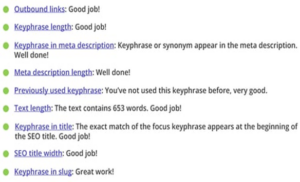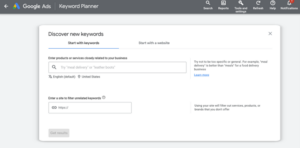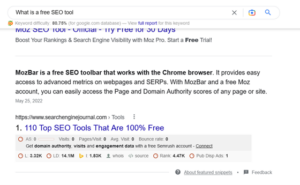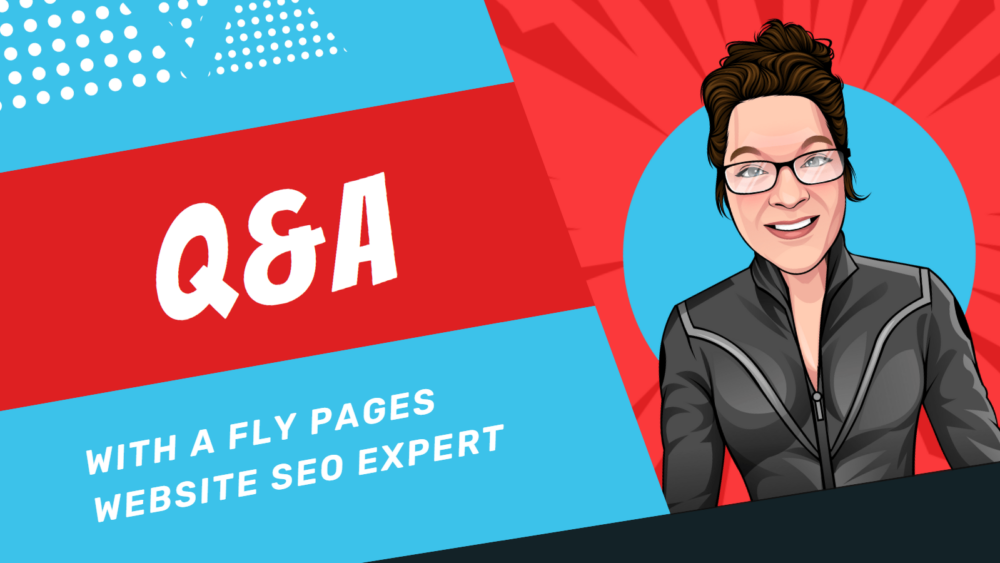Most businesses have at least a vague understanding that being found in search engine results is an important piece of any good digital marketing strategy. But search engine optimization, or SEO, is constantly evolving, and it can be tough to keep up with the latest best practices of implementing it on your website.
In this month’s blog post, we continue our Q&A series and chat with Becky Dolgener, one of our SEO experts, to answer some of our most frequently asked questions about website SEO.
Q: Why is website SEO important?
A: Search engine optimization is important for business owners because it’s how you make sure customers can find your website. You can have an amazing site, but it doesn’t matter if it can’t easily be found online. When it comes to search engine page results, you want your site to be on page one because, to quote Ricky Bobby, “If you’re not first, you’re last.” Most people won’t click past page one Google search results, so if you’re on page 2 or 3 (or worse!), you’ve got some SEO work to do.
Ideally, we recommend optimizing your site for the new era of generative and voice search trends. People aren’t just typing keywords into Google search bars anymore; they’re asking Alexa and Siri very detailed questions, and in Google and Bing, they’re reading AI search results that answer their questions way before they get to website search results.
Our goal in SEO for 2025 should be to appear in all these search platforms as an authoritative source of information; these days, search is all about topical authority and helpful content for users at different steps in the buyer journey.
Q: Any tips for a business owner trying to do it on their own?
A: It can be intimidating to get started optimizing your website, so if you’re going to DIY it, start with the most impactful changes first. WordPress sites are the easiest to optimize, which is why we love them.
Install the free version of the Yoast SEO Plugin and you’ll see an SEO score and a checklist at the bottom of every page when you’re editing it. Go through the checklist and adjust until you get a green light. Simple enough! Here’s what part of that checklist looks like, courtesy of Yoast:

Keep in mind that Google doesn’t care much about some of these “checklist” items you can find in SEO plugins. The plugin developers are slow to update their platforms, so just focus on making sure your title and meta description accurately describe your content, and that you’ve linked TO and from your content to related, popular content within your site. A score of 75/100 is usually great, as long as you’ve addressed key metadata and you have great content.
Q: How do you find the right keywords?
A: Your Yoast plugin will want you to identify a unique target keyword for every page on your website. Start with one of my favorite free tools, Google Keyword Planner, to find out which keywords people are searching for. You’ll need to set up a Google Ads Manager account to access the keyword planner, but you’ll need to do that anyway.

Go to Google Ads > Tools and Settings > Planning > Keyword Planner, and then you can start with a keyword to get related keywords, or you can start with a website. If your website isn’t optimized, don’t use it in your search. Instead, use a high-ranking competitor’s website to find new keywords your site isn’t yet ranking for. It’s genius. It’s totally legal and free. Do it!
Q: What type of content ranks best for website SEO?
A: Write content that’s helpful to both people and bots. Most sites need a lot more on-page content (i.e., the actual text people visit your site to read). Make sure it’s useful for your target audience and set a goal to provide at least 350 words on every page. Also, make it your goal to write content that is so unique to your expertise, that it could be selected by bots for generative search AI overviews.
One note about 2025 SEO: Google is doing away with Featured Snippets, which were quick answers to frequently Googled questions. They used to show up at the top of your search results (or under a dictionary definition and maybe some ads) when you ask Google a question in a search for information.

If you’re tracking Featured Snippets, you need to update your tracking platform KPIs (in Ahrefs, Moz, Semrush, or SE Ranking) to monitor Generative AI Overview appearances.
Q: How do you show up in the AI overview?
A: If you want your content to be selected by generative AI bots at the top of the search page, you’ll need to answer a frequently asked question. Figure out what that question is by Googling “What is [your page keyword]” to see what’s in the AI overview in your search results. Focus on creating content that answers that question better than anyone else, and your site could be featured in the generative search results.
Q: What about building backlinks to help with website SEO?
A: Search engine ranking takes into account all the highly ranked sites that link to your website when determining if your site is credible, useful, and authoritative. Those links are called backlinks, and they’re the SEO version of a referral.
Building backlinks can be pretty time-consuming (and expensive) unless you have a backlink-building content strategy that’s consistent and smart. SEO guru Neil Patel offers some quick backlink strategy suggestions.
When you link to a page, whether it’s in your website or someone else’s, make sure to link from a phrase that describes what the reader will find if they click on that link. The text you link from is called anchor text, and the latest Google Helpful Content Update places more importance on really descriptive anchor text, among other content quality upgrades. So, instead of using a button by itself or “click here,” “learn more,” etc., tell the reader why they want to click on that link, and what they’ll find when they do.
Your readers, and your search result rankings, will thank you.
Q: Do you have a favorite way to implement backlinks?
A: Yes! If you can identify some well-known influencers in your industry that have great websites, you could ask them to link to a relevant piece of content on your site.
But an even better suggestion would be to create content that features them as an expert source. Email them and ask for a quote, then share the link to the article or blog post with them when it’s live and invite them to share on social media and link to the content. Influencers love showing off their contributions, so getting them to share the content is usually pretty easy.
One word of caution: many SEOs are still buying backlinks. It’s still working, for now, but Google algorithm updates and manual actions in 2024 are targeting sites that sell backlinks. It’s only a matter of time before they start de-indexing sites those links lead to, so if your SEO strategy involves purchased backlinks, it’s time to modernize that approach and pivot to authentic links and mentions. Don’t underestimate the power of a brand mention on social media, even without a link!
Q: How do you keep up with website SEO?
A: Google search algorithms love recently updated content, so once you’ve optimized all the pages on your website, don’t stop optimizing. You should ideally try to add a page of new content to your website at least twice a month. That could be a blog post based on topics you find in a Google search, looking at “People also ask.” That list of questions expands each time you click on one, and it’s a great tool for identifying what your audience wants to learn more about. Use those questions to add FAQs to your top-performing pages and your conversion pages to generate traffic, then lead users through the buyer journey inside your site with relevant and helpful internal links.
When you write a new blog post, your existing website pages don’t have to just sit there getting older. Edit older blog posts to link to the new one! On every page of content, you always want at least one internal link going to a page in your website, plus at least one external link leading to a really credible resource. Remember that everything you link to should be helpful and topically related to the content you’re linking FROM.
Helpful, authentic, unique content has been our focus for years. The rest of the SEO world is just now starting to realize that gaming the system isn’t working and could be harmful in the coming months. Above all, just be the best at what you do and tell people about it with great content!
If you have more questions about website SEO or need help optimizing your website, reach out to the team at Fly Pages today! See our most recent client case study that shows how SEO fits into your digital marketing strategy: it can help your team generate qualified website leads, convert them into customers, and help you exceed your revenue goals.


